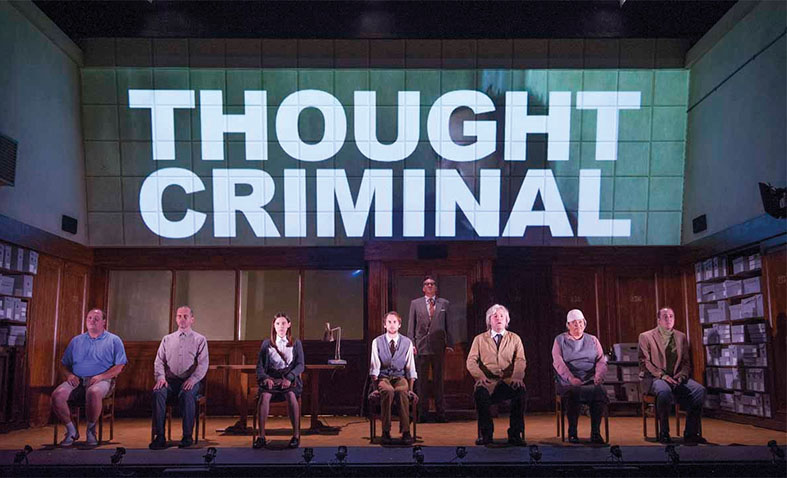Written by George Orwell in 1948, it imagines Great Britain in a future consumed by war and government surveillance. A government that Winston Smith dreams of overthrowing…
Anyone tempted to think of theatre as a safe, polite evening out – which very often, it is – would do well to book a seat to see 1984, currently in residence at Cambridge Arts Theatre.
This brand new production by Headlong, adapted and directed by Robert Icke, pushes the boundaries of what theatre can offer, challenging his audience much as Orwell challenged his readers.
The play opens on Winston Smith (Matthew Spencer) writing his journal in the semi-dark; a deep, guttural rumbling simulating his frantic heartbeat as he considers the implications of this illegal act. Throughout the play, sound and light are used to dramatic, sometimes shocking effect to capture the tension of this future world controlled by Big Brother and The Party. Love and independent thought are forbidden and punishable by torture, a moment’s work can delete a person from history and the English language is being desecrated in order to strip people of their power to rebel.
Winston, a historical revisionist, secretly despises The Party and begins to suspect the reality around him is also a construct. When he is handed a note by a young woman, Julia (played with icy allure by Janine Harouni), the pair embark on an illicit affair and plot to bring down Big Brother.
A multi-media set brings brilliantly to life 1984’s fusion of cold, 1950s austerity and sinister, futuristic technology. A clinical, tiled back wall doubles as a screen, displaying words and commands (a reminder of the omnipresent Big Brother), as well as scenes played offstage as Winston and Julia hide out in their bolthole off an antiques shop.
Without an interval, there’s nothing to distract our attention as the story unfolds, culminating in a brutal scene in Room 101 which wages war on all the senses. Unnerving, creative and intelligent, this stage adaptation of Orwell’s iconic novel well and truly hits the mark.
:: 1984, Cambridge Arts Theatre, 21-25 October 7.45pm (2.30pm Thursday & Saturday matinees). A pre-show talk also takes place on the Wednesday at 6.30pm. Tickets from £15.
We took part in a Twitter Q&A with Robert Icke on 1 October and learned lots – here are some of our favourite questions:
Q1: Hi @robertwicke, what were the main challenges of adapting 1984 for the stage & how did you overcome them?
I tried to adapt the whole structure of the novel, not just one slice of it, which was a challenge and which led to a rethinking of the theatre conventions – scene changes, doubling etc to match orwell’s structure. But we were helped by a) great, complex, source material and b) total freedom from the estate to adapt as we saw fit.
Q2: What aspects of the novel did you find most important when adapting it for the stage?
All of it! doublethink. subjectivity (‘reality is inside the skull’). surveillance. austerity. the appendix. language. newspeak – I could go on! also we v much wanted it to punch you in the stomach, just like the novel does.
Q3: If you could destroy the complete work of 1 author, including all ensuing cultural heredity, who would it be?
Great question! in terms of ideas, maybe old testament god? (well-written though).
Q4: Where did you get the idea to use such stark light and sound effects in #1984play ?
I always want theatre to feel urgent & in the same room as the audience. not something quiet happening over there
Q5: Were you worried the pensioners would faint?
Not at all: theatre isn’t for them! though as a matter of record, they have fainted and continue to faint. it’s odd that we expect theatre to be polite at all times: even when you book for 1984.
Q6: Do you feel #1984play can help inform the debate on new proposed anti-ISIS legislation?
It can stir the pot – tho it’s not didactic. winston’s right about surveillance (anti), but so is parsons (pro).
Q7: What do you hope the audience will take away from the production?
There’s not a message; we want them to go out feeling shell-shocked and thinking loads. (ideally for about a week.)

